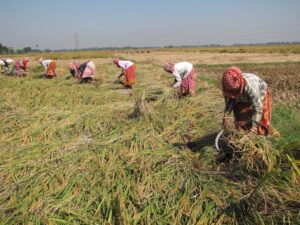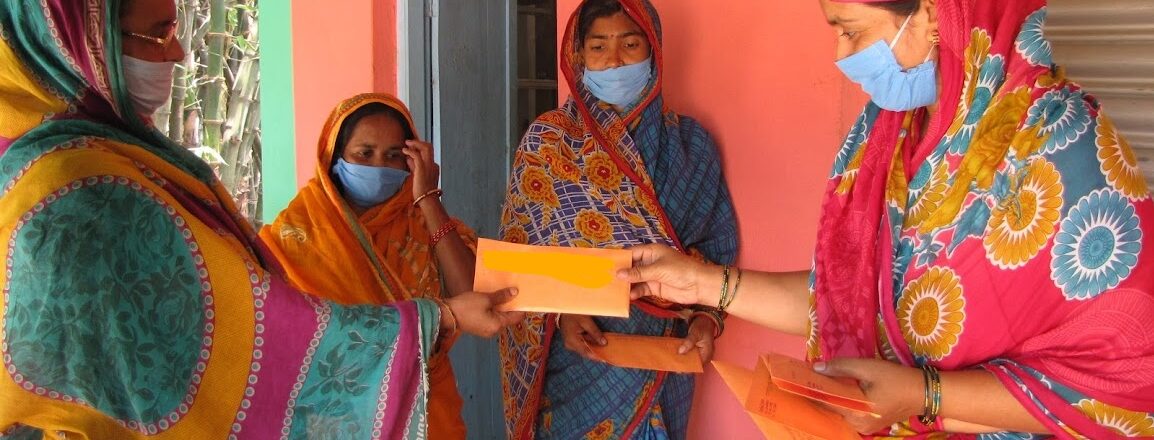An innovative USAID-PepsiCo partnership is supporting women potato farmers in India to see farming as a future
Last year, if you had told Bulti Porel that she would become an official potato supplier for multinational food, snack, and beverage corporation PepsiCo and expand her farming enterprise in the process, she would have been incredulous. Women are not generally recognized as farmers in West Bengal, India’s second largest potato-producing state. People see them as day laborers, and men see them as simply ‘helpers’ on family farms. Customarily in this region, women do not control land or make decisions about production, and are not included in farming skills training. As a result, independent farming is not a future many West Bengali women can look forward to.
This is changing for some women, thanks to a U.S. Agency for International Development (USAID) and PepsiCo partnership that is making the business case for women’s empowerment in the potato supply chain in West Bengal. Over the past two years, the partnership developed the capacity of PepsiCo’s local staff to empower women by supporting them with access to land and by providing them with the skills and knowledge to recognize and enhance their contributions to potato farming. PepsiCo’s sustainable farming training materials were adapted for women farmers through a gender-responsive and participatory approach to language and concepts.
Bulti Porel acquired skills through a series of agronomy training sessions tailored for women in 2019 that encouraged her to increase the area of her land and grow more potatoes in the second season. More than becoming a potato supplier, Bulti is increasing her knowledge of sustainable agriculture practices and making the decisions about what happens on her farm.
“My husband feels that I am taking care of farming activities, and now we buy seeds in my name. This is a great recognition I received from my family and this has happened only because of the training I received,” she said.
Potato farmer Namita Khan said that attending the training sessions gave her greater confidence to independently manage her potato farming and led her to encourage other women in her village to attend. Intentionally reaching women in the supply chain has a multiplying effect since women are more prone to share newly-acquired skills with their family members, neighbors, and fellow laborers.

Assisting Women Access Land
Access to land is a challenge for women in West Bengal, particularly those from the scheduled tribes and castes or religious minorities. The partnership is addressing this barrier by supporting women’s groups to lease farmland to produce potatoes and enter the PepsiCo value chain as independent suppliers.
“I was not comfortable and told her to stay away from this activity. How is it possible that women can farm on their own?” Azijul Rahaman, a husband asked.
At first, Rahaman was apprehensive about his wife, Anwar Begum, participating in a land leasing group and tried to dissuade her. The local male aggregator, who consolidates potatoes from a range of producers to supply larger quantities to PepsiCo, helped persuade him to trust his wife and her ambitions, showing the importance of engaging influential men in the supply chain to champion women’s empowerment.
Since these discussions, Begum and her group, Eid Mubarak, have already made two potato harvests and embraced their role as formal suppliers. In fact, in 2020-2021, Eid Mubarak managed the first and only women-led PepsiCo demonstration farm in West Bengal, showcasing agricultural technology, sustainable farming practices, and women’s leadership in farming.
Promising Results in Empowering Women
Over the past two years USAID and PepsiCo have delivered training to over 1,000 women farmers on climate-smart, regenerative agriculture practices. With increased access to information and resources, women have gained confidence, mobility, collective agency, income, and decision-making power in their families.
The partnership is doing more than empowering women farmers, it is shifting discriminatory gender norms that for generations have kept women out of the formal economy. Couples like Bulti and her husband are setting powerful positive examples in their villages that women can manage farming operations and men value their wives as equal partners. The perceptions of women’s roles in potato farming are changing in households and communities, and women are increasingly recognized as farmers in their own right.
USAID and PepsiCo will continue to build upon these results. Over the next two years, the partnership will reach more women farmers with regenerative agriculture technical training and support more women’s land leasing groups. The partnership is also creating opportunities for farming couples to reflect on gender roles, supporting women-led demonstration farms, and promoting women’s participation in male-dominated spaces such as seed distribution and visits to PepsiCo factories. These activities are critical to shift discriminatory gender norms and model positive behaviors that promote gender equality in the supply chain.
Empowering women in West Bengal has opened an important pathway to expand PepsiCo’s farming supply base. The four-year USAID partnership will build upon these promising results and continue to demonstrate that empowering women can promote women’s agency, increase income for families, and help PepsiCo meet its economic, social, and environmental goals.
A factsheet with Key Results of the first two years of the USAID-PepsiCo partnership in West Bengal is available here.
Read the story of Shyamal Pal, Potato Aggregator and Long-Time Champion of Women’s Empowerment.


